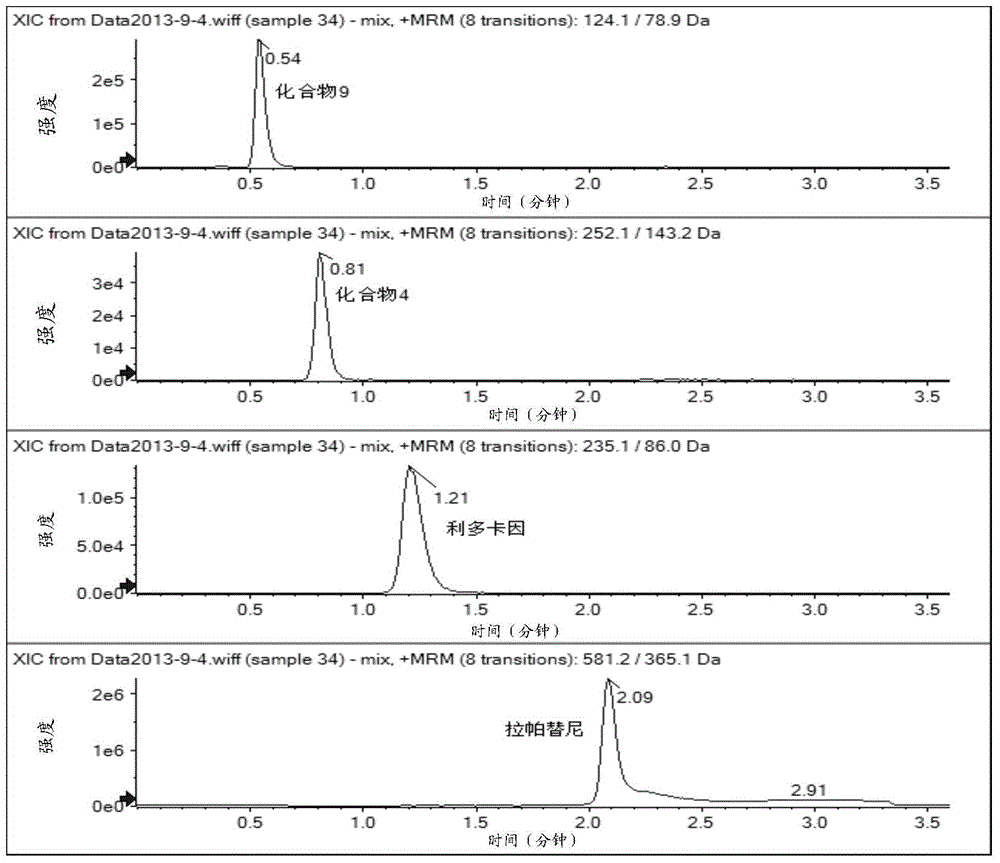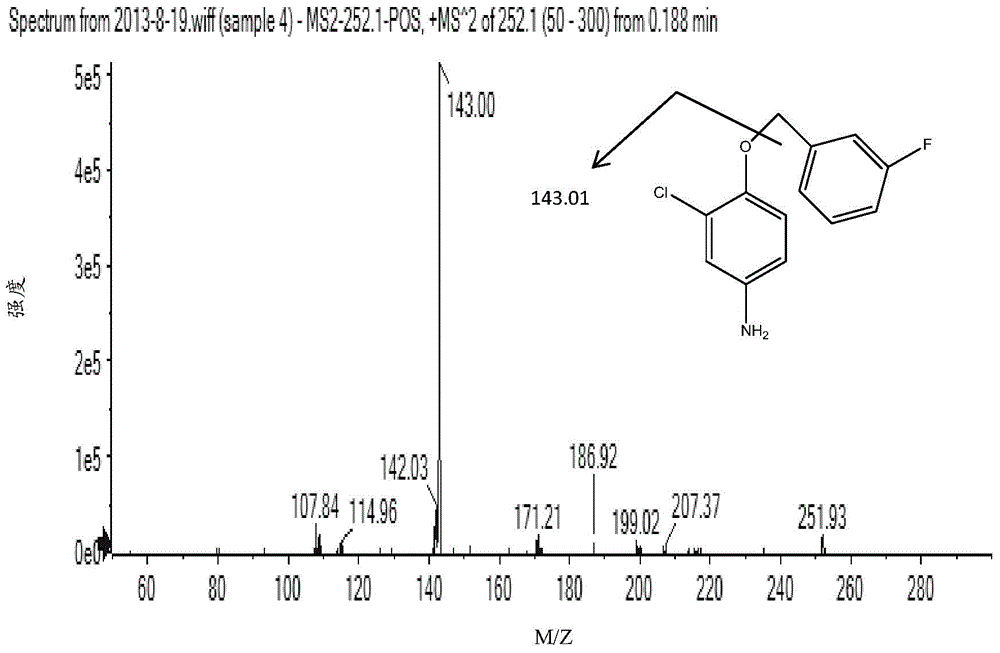Method for detecting impurity content in lapatinib through combination of LC-MS and MS
A technology of lapatinib and fluorobenzyloxy, applied in the field of drug analysis, can solve the problems that there is no method for determining the content of compound 4 and compound 9, which has been reported, and the method for analyzing and determining the content of impurities needs to be improved, and the detection result is achieved. Accurate and reliable, easy to operate, good repeatability
- Summary
- Abstract
- Description
- Claims
- Application Information
AI Technical Summary
Problems solved by technology
Method used
Image
Examples
Embodiment 1
[0066] Use a mass spectrometer (ABSciexQ-Trap4500) to perform a full scan (Q1Scan) on compound 4, compound 9, and lapatinib in positive ion mode, find the corresponding parent ion, and then do the corresponding secondary ion on the parent ion, select the intensity The higher product ions are used as the final detection ions, see the spectrum Figure 2 to Figure 5 . Finally, each compound selects an ion pair with higher intensity, and optimizes the corresponding parameters (ion source parameters, parameters related to the compound). The results are shown in Table 3 and Table 4.
[0067] Table 3: Ion source parameters
[0068] polarity positive electrode scan type MRM Curtain gas (CUR) 30psi Ion source (GS1) 50psi Ion source (GS2) 60psi ion ejection voltage 5500V temperature 550℃
[0069] Table 4: Compound-related parameters
[0070]
[0071]
Embodiment 2
[0073] Using 5 types of chromatographic columns (SynergiHydro-RP, 50*3.0, 4μm; SynergiPolar-RP50*3.0, 4μm; AquasilC1850*2.1mm, 5μm; Kromasilsilica50*3.0mm, 5μm; Betasilsilica-10050*2.1mm, 5μm), With acetonitrile as mobile phase B and water (containing 5 mM ammonium formate) as mobile phase A, compound 4 and compound 9 were detected by LC-MS / MS respectively, and the chromatograms were recorded.
[0074] result:
[0075] When Hydro-RP and Polar-RP columns were used, compound 9 was basically not retained on Hydro-RP and Polar-RP columns.
[0076] When using AquasilC18 chromatographic column, compound 9 was not retained when low organic phase (20% acetonitrile isocratic elution) was used, but compound 9 was retained in high organic phase (95% acetonitrile isocratic elution).
[0077] Compound 9 was strongly retained, but compound 4 was not, using Betasilsilica-100 and Kromasilsilica columns.
[0078] Therefore the present invention preferably adopts AquasilC18 chromatographic co...
Embodiment 3
[0079] Embodiment 3: methodological investigation and sample analysis
[0080] According to the limit of compound 4 is not higher than 4ug / 1g, the limit of compound 9 is not higher than 0.02%, the calibration range of the two compounds is respectively 0.200ng / ml-10.0ng / ml (compound 4), 10ng / ml ml—500ng / ml (compound 9). Instruments and reagents
[0081] Reagents: acetonitrile (Fisher), water, ammonium formate, lapatinib API (14 batches), 4-(3-fluorobenzyloxy)-3-chloroaniline (batch number: 120814), 2-( Thiamyl) ethylamine hydrochloride (batch number: 20120521CMQA-1-MZP-01-014).
[0082] Instrument: mass spectrometer: ABSciexQ-Trap4500,
[0083] HPLC: Shimadzu20ACXR
[0084] (1) Preparation of reference substance stock solution: Take an appropriate amount of reference substance (compound 4, compound 9) and dissolve it in a solvent (acetonitrile: water = 4:1) to prepare a 1.00 mg / ml stock solution. Then compound 4 was diluted with acetonitrile: water (1:1) to an intermediate...
PUM
| Property | Measurement | Unit |
|---|---|---|
| concentration | aaaaa | aaaaa |
Abstract
Description
Claims
Application Information
 Login to View More
Login to View More - R&D
- Intellectual Property
- Life Sciences
- Materials
- Tech Scout
- Unparalleled Data Quality
- Higher Quality Content
- 60% Fewer Hallucinations
Browse by: Latest US Patents, China's latest patents, Technical Efficacy Thesaurus, Application Domain, Technology Topic, Popular Technical Reports.
© 2025 PatSnap. All rights reserved.Legal|Privacy policy|Modern Slavery Act Transparency Statement|Sitemap|About US| Contact US: help@patsnap.com



